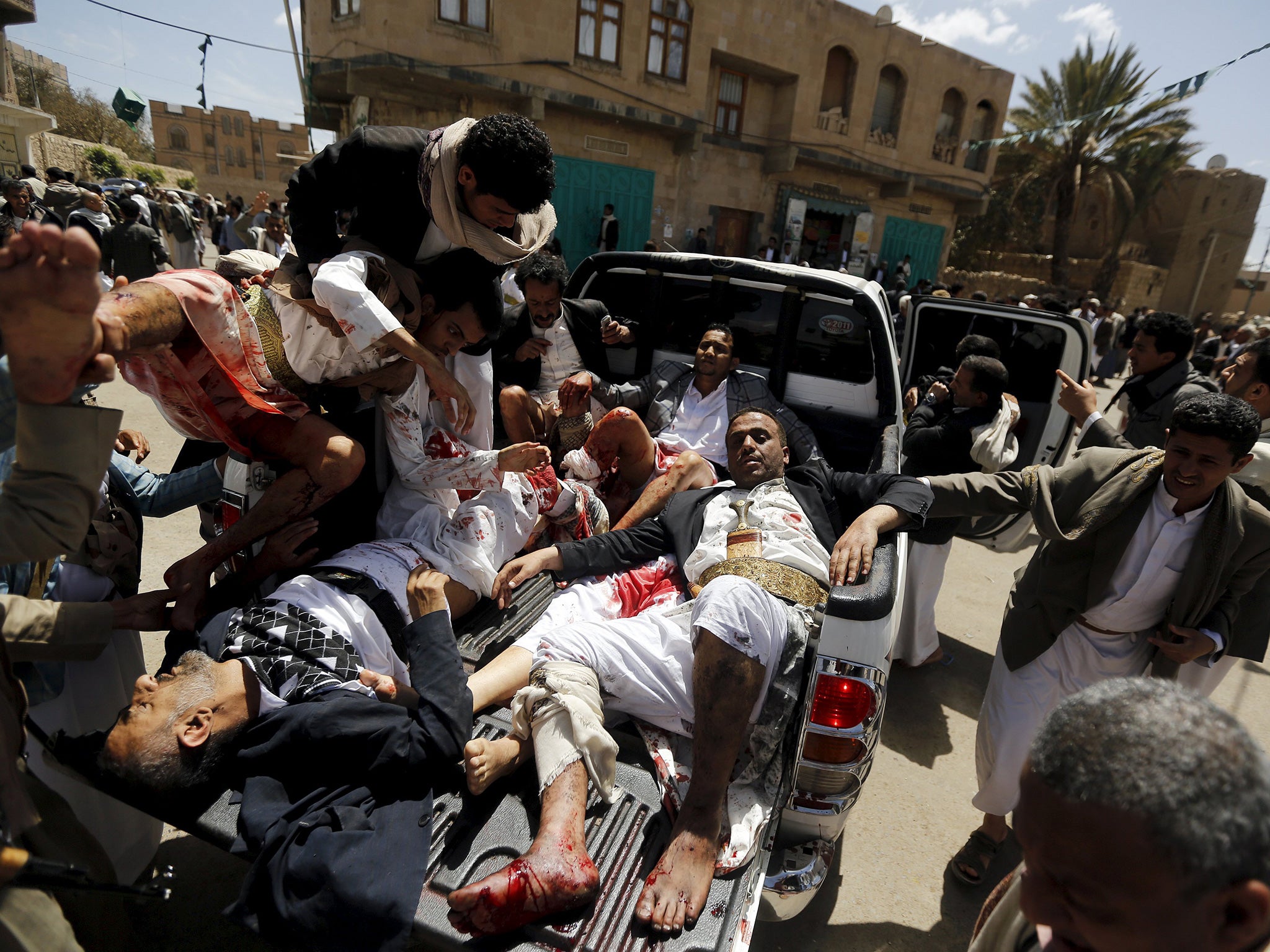Yemen Isis mosque bombings: 'Blood was running like a river', say survivors after attack kills at least 120
Suicide bombers attack two Zaidi Shia mosques in Yemen’s capital, Sanaa, killing at least 120 worshippers and injuring hundreds more

Your support helps us to tell the story
From reproductive rights to climate change to Big Tech, The Independent is on the ground when the story is developing. Whether it's investigating the financials of Elon Musk's pro-Trump PAC or producing our latest documentary, 'The A Word', which shines a light on the American women fighting for reproductive rights, we know how important it is to parse out the facts from the messaging.
At such a critical moment in US history, we need reporters on the ground. Your donation allows us to keep sending journalists to speak to both sides of the story.
The Independent is trusted by Americans across the entire political spectrum. And unlike many other quality news outlets, we choose not to lock Americans out of our reporting and analysis with paywalls. We believe quality journalism should be available to everyone, paid for by those who can afford it.
Your support makes all the difference.More than 120 people died and hundreds were injured as four suicide bombers attacked two mosques in Yemen’s capital city. So many people were killed or injured that hospitals in Sanaa struggled to cope with the emergency and public pleas were made for blood donors to come forward.
Many of the worshippers in the mosques were supporters of the Shia Houthi fighters who control the capital, and responsibility for the carnage was claimed by Isis which regards all Shia as heretics – though it was impossible to immediately verify this and some analysts were sceptical. The final death toll was uncertain last night, with sources giving varying accounts, at least one putting it at 137 with a further 350 people injured. But the authorities warned that with so many of the wounded suffering critical injuries the toll is sure to rise.
After the blasts the wounded were loaded on the back of pick-up trucks and were taken to hospitals where, as they waited for treatment, they lay side by side with the dead. Among the dead was, according to Al Jazeera and Houthi-owned television, the imam of the Badr mosque, the prominent Houthi cleric al-Murtada bin Zayd al-Mahatwari.
Two senior Houthi leaders, both members of the Zaidi Shia sect and named as Taha al-Mutawakkil and Khalid Madani, were reported to have been seriously wounded.
“Dozens of people have been injured or killed. We will understand the exact numbers of [the] dead and wounded soon. These are two very central and commonly used mosques,” the editor-in-chief of the Yemen Post newspaper, Hakim Almasmari, told reporters.

Each of the mosques was attacked by two suicide bombers. One bomber at the Badr mosque was caught by militia guards searching worshippers at the entrance and detonated his device at the outside gates. Amid the ensuing panic, a second bomber entered the mosque to detonate his device amidst crowds of worshippers, according to the official news agency Saba.
A second pair of suicide bombers attacked the al-Hashoosh mosque, according to the state news agency. “The heads, legs and arms of the dead people were scattered on the floor of the mosque,” said an eyewitness, Mohammed al-Ansi. “Blood was running like a river.” He described running for the exit and hearing a man scream: “Come back, save the injured.”
A survivor from the Badr mosque, Ahmed al-Gabri, said: “I fell on the ground and when I regained consciousness I found myself sleeping on a lake of blood.”
Another, Sadek al-Harithi, described the scene to the Associated Press as “an earthquake where I felt the ground split and swallow everyone”.
The Shia Houthis are sworn enemies of Yemen’s al-Qaeda branch, al-Qaeda in the Arabian Peninsula, regarded by many to be the most dangerous and active al-Qaeda affiliate and a frequent trainer of jihadists from Europe. An al-Qaeda official denied being involved in the bombings, citing its historical refusal to target mosques.
The hitherto little-known Yemeni branch of Isis described the bombings as a “blessed operation” against the “dens of the Shia”.
In Washington, the White House spokesman Josh Earnest said there was no indication Isis had any operational link to the bombings. He stressed that Isis often claims attacks purely for propaganda value.
The Houthis have controlled Sanaa since September and have been battling al-Qaeda fighters in various parts of Yemen. They recently forced President Abd-Rabbu Mounsour Hadi into exile after taking control of Sanaa. The UN-recognised President has set up a rival seat in Aden, in the south of the country, with the backing of Sunni-led Gulf Arab states.
Adam Baron, a visiting fellow on the European Council on Foreign Relations, told The Independent last night: “This threatens to put Yemen on a whole new very disturbing level of sectarian violence. People used to look at Syria and think, ‘That could never be us’. Now they are looking at each other and saying, ‘What the hell?’”
Mohammed al-Bukhaiti, a member of the Houthis’ political bureau, blamed al-Qaeda for the attack. Meanwhile, Mohamed Qubaty, a Yemeni political adviser, told Al Jazeera: “What we have seen today is a plot to widen the schism between the Sunnis and Zaidis.”
The Sanaa mosque attacks happened the day after an unidentified warplane attacked the presidential palace in Aden, while yesterday anti-aircraft guns opened fire as planes were again flying high over the presidential compound.
Further signs of the country’s divided and chaotic state came yesterday as al-Qaeda fighters took control of the southern city of al-Houta. Militants driving pick-up trucks and flying black flags swept through the city and took over the main security barracks, the governor’s office, and the intelligence headquarters.
Join our commenting forum
Join thought-provoking conversations, follow other Independent readers and see their replies
Comments